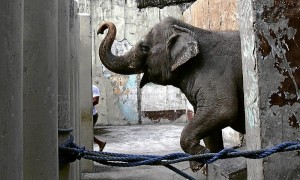Nobel winner backs calls to free ‘Mali’

ACCLAIMED novelist J.M. Coetzee writes of Manila zoo’s 38-year-old, 7-ton resident: “Mali has paid the penalty for not being fortunate enough to be born human.” AFP/GETTY IMAGES
The campaign to free “Mali” continues to draw international support, this time from the literary world.
Taking up the cause of an animal rights watchdog, 2003 Nobel Prize winner J.M. Coetzee has appealed to Philippine officials to have Manila zoo’s lone elephant transferred to a sanctuary in Thailand.
“I am writing in support of the campaign to remove the elephant Mali from the zoo in Manila, where she has spent the past 35 years, to a place of safety,” the Nobel laureate said in a letter to the Department of Agriculture.
The local chapter of the People for the Ethical Treatment of Animals (Peta) released excerpts of Coetzee’s letter in a press statement yesterday.
“Thirty-five years is a heavy sentence to bear, longer than is served by most murderers. Mali has paid the penalty for not being fortunate enough to be born human. Now it is time to release her,” Peta quoted the novelist as saying.
Article continues after this advertisementCoetzee won the Nobel Prize for Literature in 2003 and the Booker Prize in 1983 and 1999. His acclaimed works include “Waiting for the Barbarians,” “The Lives of Animals,” “Elizabeth Costello,” “Diary of a Bad Year” and “Summertime.” Coetzee was born in South Africa but is now a citizen of Australia.
Article continues after this advertisementAlso in support of Peta, British rock icon Morrissey wrote President Aquino in May asking for the release of the 7-ton Mali, who was a three-year-old orphan when brought to Manila in 1980 as a gift from the Sri Lankan government to then First Lady Imelda Marcos.
Also in May, Peta hosted in Manila US-based elephant veterinarian Henry Richardson, who also called for Mali’s transfer to a sanctuary, saying the animal was suffering from potentially fatal foot problems in his mostly concrete enclosure.
Zoo officials, however, maintained that Mali was doing fine at the zoo and that the animal might not survive in the wild.
Executive Secretary Paquito Ochoa Jr. has convened a multisectoral committee to study the proposals and advised agriculture and environment officials to facilitate her immediate transfer to a sanctuary subject to the outcome of their study.
Peta contends that Mali has been denied the needed stimulation, a terrain to explore, the companionship of other elephants, and other natural elements needed by such an animal.
The group said Mali had endured intense confinement, loneliness, boredom, and isolation in an area that was just a tiny fraction of the size of her natural habitat.
Reached for comment, director Theresa Mundita Lim of the Protected Areas and Wildlife Bureau said the agency would support any plan to bring Mali back to Sri Lanka or any sanctuary abroad on certain conditions.
In a position paper, PAWB said it would support Mali’s transfer if she’s physically fit to survive the transfer and is free from any contagious diseases.
Considering that Mali is in her productive age, she should also be protected from possible “genetic contamination” if ever transferred, the paper added.
“She should not be mixed with other sub-species of elephants,” Lim explained
Should Sri Lanka refuse to take Mali back, PAWB said Peta’s proposal to bring her to a sanctuary in Thailand may also be considered.
“A facility that will separate Mali from elephants of non-Sri Lankan origin must also be provided in the Thailand sanctuary,” PAWB said.
